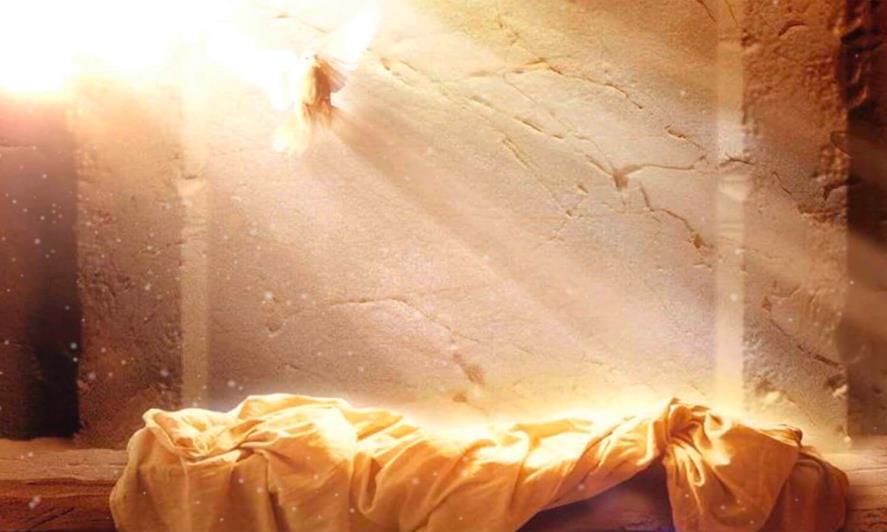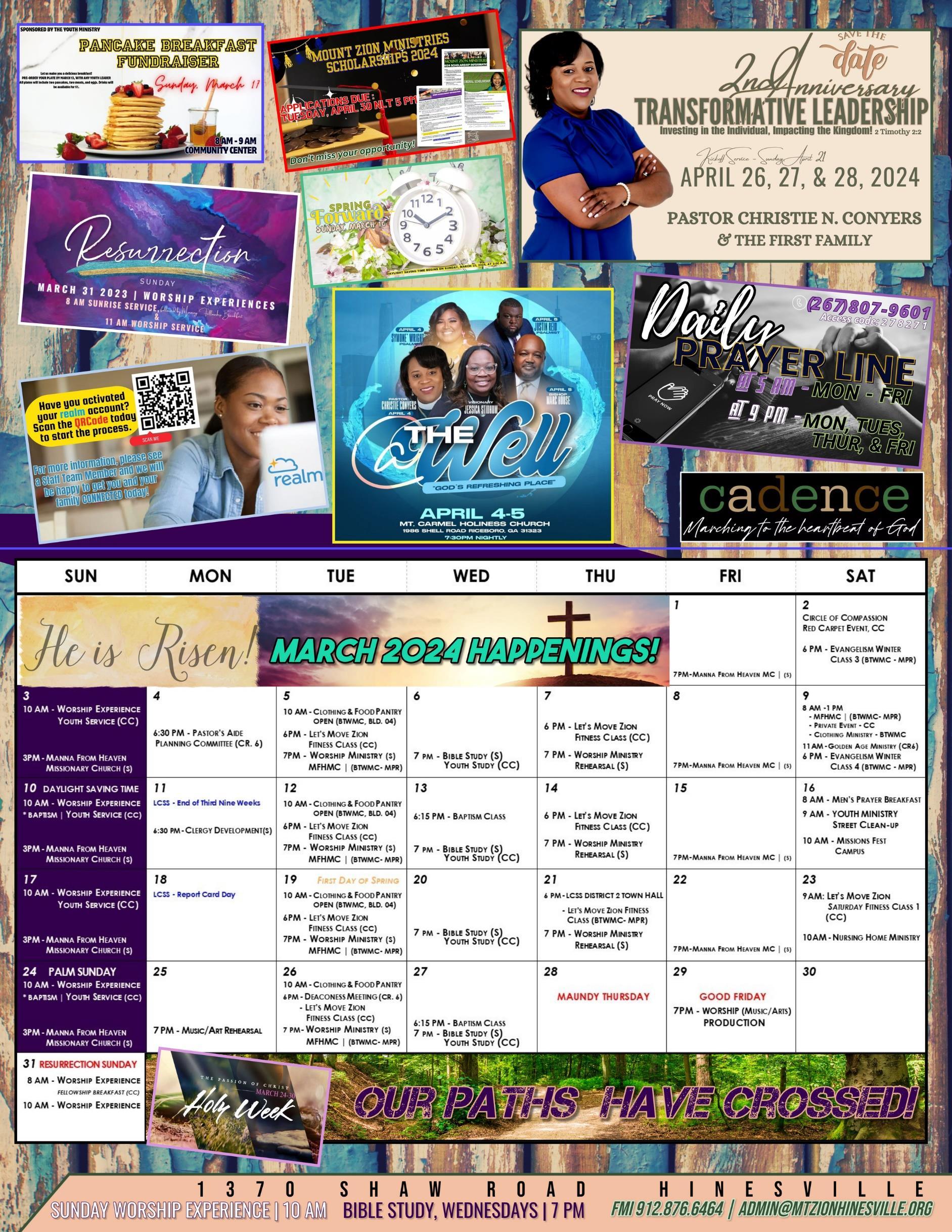

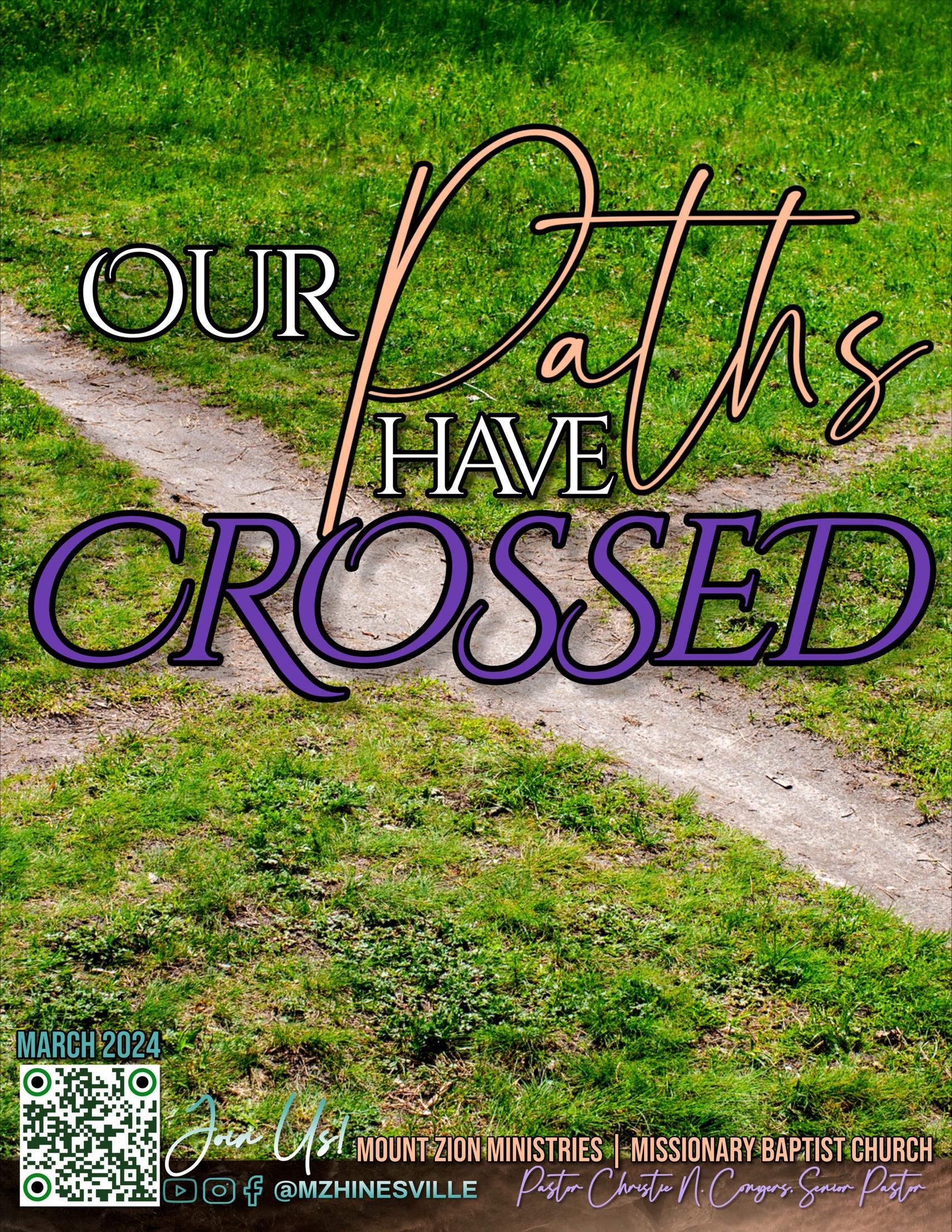
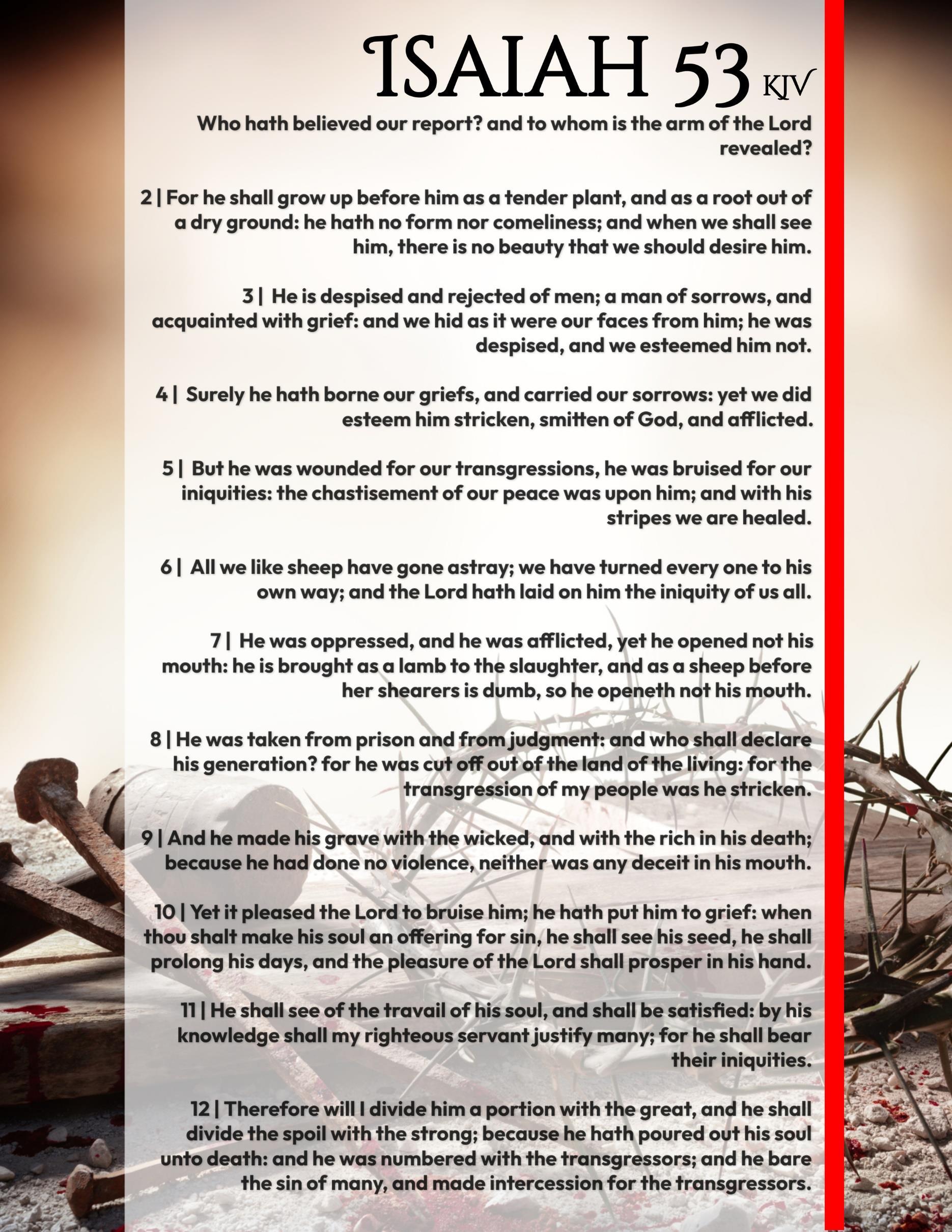
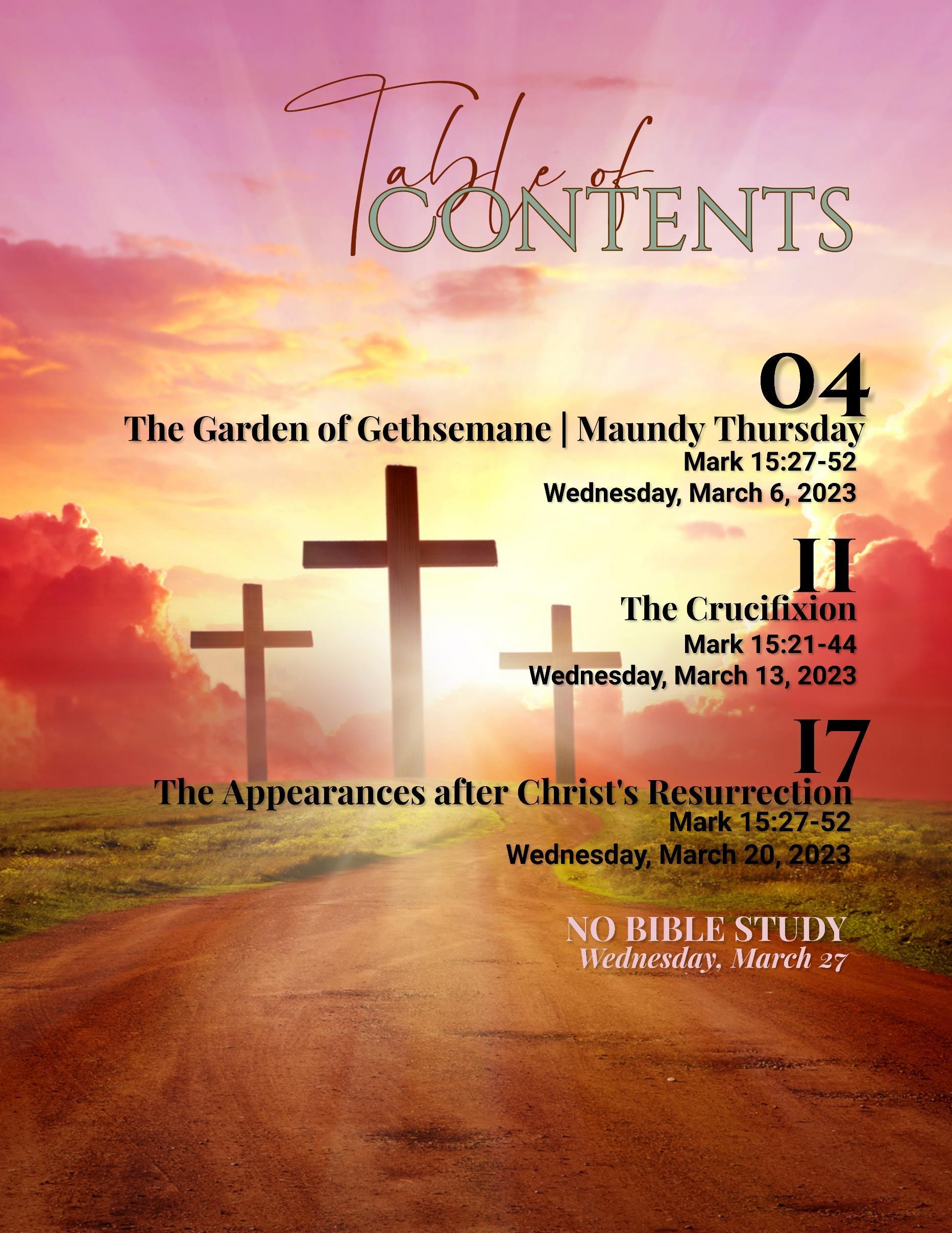








FOCUS SCRIPTURE: Isaiah 53
COURSE OBJECTIVES:
Believe: Jesus' coming was the plan for salvation
Feel: The depth of his love through his sacrifice on the cross Do: To testify, demonstrate, and walk in the love of Christ more readily
INTRODUCTION: As established, Judas was pointed out by Jesus as His betrayer. Judas had left the room and gone out to betray Jesus. While Judas is gone, Jesus has instituted the Lord’s Supper to be done in remembrance of Him. Jesus and the disciples have left the city of Jerusalem and are walking to the Mount of Olives.
As they are walking Jesus says to the remaining disciples: “All ye shall be offended because of me this night: for it is written, I will smite the shepherd, and the sheep shall be scattered” (Mk. 14:27) Much like Peter and the other ten disciples, Christians are susceptible to straying from Jesus. In the text, Jesus makes another startling prediction: All of you will run away (from the word that we get “scandal”) from me. However, He also said, “After I have been resurrected, I will go ahead of you to Galilee.”
JESUS’ PREDICTION AND THE DISCIPLES’ RESPONSE MARK 14:27-31
And Jesus saith unto them, All ye shall be offended because of me this night: for it is written, I will smite the shepherd, and the sheep shall be scattered.28 But after that I am risen, I will go before you into Galilee.29 But Peter said unto him, Although all shall be offended, yet will not I.30 And Jesus saith unto him, Verily I say unto thee, That this day, even in this night, before the cock crow twice, thou shalt deny me thrice.31 But he spake the more vehemently, If I should die with thee, I will not deny thee in any wise. Likewise also said they all.
As Jesus and His disciples are walking out to the Mount of Olives, along the way Jesus makes another startling statement. Just as Jesus made a startling statement at the table that one of them would be His betrayer, Jesus has another bombshell to tell His disciples: “All of you will fall.” How startling and upsetting these words would have been to these eleven dedicated followers of Christ. Jesus further states that this would be the fulfillment of prophecy, “I will strike the shepherd and the sheep will be scattered.” This prophecy can be found in Zechariah 13:7. The striking of the shepherd clearly refers to being killed, for Jesus continues that after He has been resurrected, He will go ahead of His disciples to Galilee.
Peter immediately jumps into the conversation with great words of faith and dedication. “Even if everyone falls, yet I will not!” You have to admire these words of Peter. He
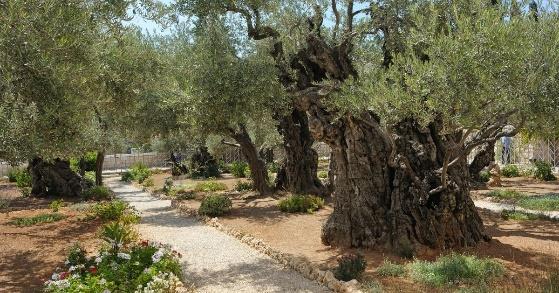
knows his own heart and his own intentions. He loves Jesus and He is ready to stand with Jesus. But Jesus makes a specific prediction about what Peter will do. This very night Peter is going to deny Jesus three times before dawn when the rooster crows. As difficult as the first prediction must have been for the disciples to hear that they would all fall, how much more difficult to hear that Peter would deny Jesus this very night before the dawn of the sun! Not only would Peter deny Jesus, but also he would deny Jesus three times in the span of a couple of hours. Peter insisted emphatically that he would not deny Jesus. Peter even says, “If I have to die with You, I will never deny You!” All the rest of the disciples say the same thing. We are reading about some very dedicated men who are ready in their minds to die for their Lord. This is the faith that has been evident previously in the gospels. When Jesus decides to go to Jerusalem despite the fact that the Jewish leaders want to kill Him, Thomas says that they should all go with Him and die with Him. They have dedication and loyalty to Jesus. Jesus says they will all fall and that Peter will deny Him three times. The disciples insist that they will not fall and that Peter will not deny Jesus.
And they came to a place which was named Gethsemane: and he saith to his disciples, Sit ye here, while I shall pray.33 And he taketh with him Peter and James and John, and began to be sore amazed, and to be very heavy;34 And saith unto them, My soul is exceeding sorrowful unto death: tarry ye here, and watch.35 And he went forward a little, and fell on the ground, and prayed that, if it were possible, the hour might pass from him.36 And he said, Abba, Father, all things are possible unto thee; take away this cup from me: nevertheless not what I will, but what thou wilt.37 And he cometh, and findeth them sleeping, and saith unto Peter, Simon, sleepest thou? Couldest not thou watch one hour?38 Watch ye and pray, lest ye enter into temptation. The spirit truly is ready, but the flesh is weak.39 And again he went away, and prayed, and spake the same words.40 And when he returned, he found them asleep again, (for their eyes were heavy,) neither wist they what to answer him.41 And he cometh the third time, and saith unto them, Sleep on now, and take your rest: it is enough, the hour is come; behold, the Son of man is betrayed into the hands of sinners.42 Rise up, let us go; lo, he that betrayeth me is at hand.
Jesus and His disciples come to a place called Gethsemane and Jesus tells His disciples to sit there while He prays. Then Jesus takes Peter, James, and John with Him and goes a little further. What we now read begins to remind us about the humanity of Jesus. Mark tells us that Jesus began to be horrified and deeply distressed. We must envision the turmoil that Jesus is experiencing. Jesus even says directly to Peter, James, and John, “My soul is swallowed up in sorrow–to the point of death.” We cannot even begin to know the distress that Jesus is feeling right now. He knows that He is moments from His arrest. He knows that He is going to be beaten, painfully mistreated, and scourged. He knows that He is going to be made fun of, mocked, and humiliated publicly for all of Jerusalem to see, including His disciples and His mother. He knows that He is going to be nailed into a cross and hang on that cross for hours. The Son of God is going to experience all of these things. The writer
of Hebrews said, “In bringing many sons to glory, it was fitting that God, for whom and through whom everything exists, should make the author of their salvation perfect through suffering” (Hebrews 3:10). No man has ever known what Jesus would go through. No one could foresee all the events of their own betrayal, rejection, arrest, painful mistreatment, crucifixion, and death. These things were heavily weighing upon Jesus’ mind. Jesus, with all these things in mind, instructs Peter, James, and John to stay here and to stay awake.
Jesus then goes a little further, falls to the ground, and prays that if it is possible that the hour might pass from Him. Jesus prays, “Father! All things are possible for You. Take this cup away from Me. Nevertheless, not what I will, but what You will.” I wonder at how great the temptation was for Jesus to call all of this off. This was Jesus’ purpose and the fullness of time had come. But how easy it could have been to avoid the agony and avoid the cross by stopping all that was about to happen. Jesus could have left the garden and given up on what He was supposed to do. We will spend more time looking at the nature of Jesus’ prayer later in the lesson. After prayer, Jesus comes back to His disciples, whom He had instructed to stay awake with Him, and finds them sleeping. Jesus tells His three disciples to stay awake and pray. Jesus specifically directs His words at Peter, after telling Him about his coming denial, to stay awake and pray so that he will not enter into temptation. Jesus then goes away and prays again, saying the same thing. When Jesus returns, He finds the three disciples sleeping again. Jesus now tells them that it is time. The time has come, for the Son of Man is being betrayed into the hands of sinners.
THE ARREST OF JESUS MARK 14: 43-52
And immediately, while he yet spake, cometh Judas, one of the twelve, and with him a great multitude with swords and staves, from the chief priests and the scribes and the elders.44 And he that betrayed him had given them a token, saying, Whomsoever I shall kiss, that same is he; take him, and lead him away safely.45 And as soon as he was come, he goeth straightway to him, and saith, Master, master; and kissed him.46 And they laid their hands on him, and took him.47 And one of them that stood by drew a sword, and smote a servant of the high priest, and cut off his ear.48 And Jesus answered and said unto them, Are ye come out, as against a thief, with swords and with staves to take me?49 I was daily with you in the temple teaching, and ye took me not: but the scriptures must be fulfilled. 50 And they all forsook him, and fled.51 And there followed him a certain young man, having a linen cloth cast about his naked body; and the young men laid hold on him:52 And he left the linen cloth, and fled from them naked.
While Jesus is still speaking these words, Judas arrives with a mob that has swords and clubs. The large crowd has been sent from the chief priests, scribes, and elders. How frightening a scene this must be as a mob is moving closer to you in the middle of the night with torches lighting the way and swords and clubs in their hands. But if this is not frightening enough,
the gospel of John tells us that the chief priests and Pharisees have ordered a Roman detachment of soldiers to go, too. A Roman detachment, or cohort, of soldiers was 600 in number. We do not know if this is the exact number of soldiers coming, but even if it is only a fraction of that, it is enough to strike fear into the hearts of the disciples. Judas then walks right up to Jesus, says “Rabbi,” and kisses Him. This is the sign so that the large mob can identify Jesus in the middle of the night. Immediately, the mob lay their hands upon Jesus and arrest Him.
Peter then draws His sword and cuts off the ear of the servant of the high priest. Peter said that he was ready to die with Jesus, and his actions prove those words thus far. Peter is ready to defend Jesus. He is not going to allow His Lord to be taken away without a fight. But Jesus intervenes. Jesus notes how this large mob and detachment of soldiers have come brandishing their weapons. Yet Jesus was in the temple courts every day simply teaching, and nothing was done. I believe Jesus is noting not only their need for a great force to arrest Him, but that they are choosing to do this at night. Every day Jesus had been in the temple complex teaching and they did not do anything. But now they will arrest Him in the night. But the scriptures must be fulfilled. Luke records Jesus’ final words of the arrest, “But this is your hour–when darkness reigns” (Luke 22:53).
But then we come to some of the saddest words recorded in the gospel. “Then all the disciples forsook Him and fled” (14:50). The disciples who insisted that they would never fall and insisted that they would never deny Jesus, now run away. In verses 51-52 we read of one young man running away naked. What we see is that the soldiers were ready to arrest not only Jesus, but anyone who was His follower. We see this in John 18:4-9 (4 Jesus therefore, knowing all things that should come upon him, went forth, and said unto them, Whom seek ye?5 They answered him, Jesus of Nazareth. Jesus saith unto them, I am he. And Judas also, which betrayed him, stood with them.6 As soon then as he had said unto them, I am he, they went backward, and fell to the ground.7 Then asked he them again, Whom seek ye? And they said, Jesus of Nazareth.8 Jesus answered, I have told you that I am he: if therefore ye seek me, let these go their way:9 That the saying might be fulfilled, which he spake, Of them which thou gavest me have I lost none.) where Jesus demands that His disciples be let go. What love Jesus still showed His disciples that He did not care about Himself, but about His disciples. Though He was about to endure such terrible treatment and be forsaken, Jesus’ concern was first for His disciples. What selfless acts we continue to see in Christ, even in His hour of need.
THE PRAYER OF JESUS
A. PERSISTENCE IN PRAYER
We certainly would be remiss if we did not consider for a few moments the way that Jesus prayed. One of the obvious points for our consideration is the persistence Jesus had in prayer. Three times Jesus went a short distance and prayed to God. Jesus did not feel that
it was enough to simply offer one prayer and think that it would be sufficient. Jesus continued to pray the same things until His betrayer arrived with the large mob and Roman soldiers. If Jesus, the Son of God, saw the need to pray repeatedly and with persistence, should not we as His followers and mere human beings do the same? If anyone had access to God and the ability to sway the mind of the Father, Jesus was certainly the one. Even still, He saw the need to pray repeatedly what He desired. This is such an important lesson. Too many times our requests are made only once to God, and we do not show our earnestness in prayer. Three times within a very short time Jesus continued to repeat His request that the hour might pass from Him. If we want to receive answered prayer, it is time for us to be more persistent. We all need to call upon the Lord repeatedly about what we need and desire.
Another key element in Jesus’ prayer is that He prayed according to the will of the Lord. Though Jesus repeatedly prayed that the hour may pass from Him, Jesus also said, “Nevertheless, not what I will, but what You will.” Though Jesus wanted a particular outcome, and wanted this cup of distress to leave Him, what truly mattered was God’s will and not His own. Our prayers must be prayed according to the will of the Father. I am afraid that too often we do not say these words and we do not want God’s will first in our lives. We want our will to take precedence. What often matters to us is what we want. Our prayers will never be answered if we only ask for our own selfish desires (James 4:3). God’s will must always be more important than our will.
Did Jesus get what He prayed for? Did the hour pass from Jesus? Did the cup pass from Him? The answer to all three questions is “No.” Jesus did not get what He asked from the Lord. Despite the answer being “no,” Jesus still did the Father’s will. He did not throw in the towel, chastise the Father, or resort to complaining or depression. If the Son of God received an answer of “no” from the Lord, do you suppose that we may receive a “no” answer from time to time? Of course we will receive a “no” answer. Why did the Father say “no” to Jesus? It seems clear that the reason the answer was “no” was because God was working something greater. While the path was painful, Jesus would become the sacrifice for sins and the author of salvation. It was necessary for the answer to be “no” since it was not only to glorify Jesus but to save the world. We must see that there are reasons why we receive “no” answers from the Lord. But we trust that He is working greater things in us that we cannot see when the answer is “no.” We must not lose faith, but have greater trust in God that He knows what is best and is accomplishing something in our lives.
But in the greatness of Jesus we also see the shortcomings of ourselves. For all that Jesus was enduring and sacrificing for us, we see that we completely miss the mark for what Jesus has asked of us. How often we do not live up to our words, just as these disciples did.
The disciples said that they would never forsake Jesus, never deny Jesus, and would die with Jesus before any of these things would happen. Yet the disciples fell short of their words. We learn a valuable lesson, one that is rather obvious but necessary to consider. It is one thing for us to “talk the talk,” but it is entirely different to “walk the walk.” It is easy to claim to be a follower of Christ and say that we would remain with Him through thick and thin. It is entirely different when the hour of temptation comes and our words are put to the test. What we think we can endure and what we can endure are usually two different levels. We are not as mature in Christ as we often think we are.
There are many times that we are unable to stay with Him, as He requested of Peter, James, and John. It was an important time to spend with Jesus. Jesus was on the ground just a few paces away praying, yet the disciples could not stay awake with Him. I wondered, at reading this passage, how often we are the same. When it is the time of temptation and the time of trouble, and our Lord is right there, we will not spend time with Him. How often we neglect to spend time with our Lord. Instead, we are sleeping or caving in to the desires of our flesh. There are more important things to be doing in the kingdom of God , yet we place such a priority on the clamor of our flesh.
The worst of all is to see His disciples forsake Jesus and run away from Him. What a terrible choice we make to turn and run away from Jesus! Where are we running to? There is nowhere to run to if we are not running to Jesus! What else will give us peace and rest? Where else can we go to have our burdens lifted and our worries removed? I wonder about that scene as well. While I understand the reason the disciples ran, since they were to be put under arrest as well, I do not understand where they were running to. Where were the disciples going to go? After making some hard teachings, many disciples no longer followed Jesus. Jesus asked His disciples, “Do you also want to go away?” Peter gave an excellent response, “Lord, to whom shall we go? You have the words of eternal life” (John 6:68). Where are we going to run to if we are not going to run to Jesus? He is the one with the words of eternal life. He is the one who can offer deliverance and salvation from the evil of this world. Where are we going to go? Let us not forsake Jesus by seeing there is nowhere else to go.
Jesus hit our problem directly on the head when He said, “The spirit is willing but the flesh is weak.” We have to know our weaknesses. We must know that we have areas that are exposed to Satan’s darts. As long as we are in the flesh, we will be exposed. Our spirits may be strong, but our spirits are in a fight with the flesh. There are times when the flesh is going to win. We are foolish if we ignore this reality. We must see what we are up against. We
must know the battle that we are involved in. “For our struggle is not against flesh and blood, but against the rulers, against the authorities, against the powers of this dark world and against the spiritual forces of evil in the heavenly realms” (Ephesians 6:12 ). But this is not all that we are to do. It is important to recognize that we are human and are subject to our sinful desires through the flesh. But we cannot leave it at that.
Jesus told His disciples to be watchful. Jesus was telling them to make preparations. The hour of temptation was coming upon them. It was no time to be unprepared when the temptation struck them with its weight. Because of their lack of preparation, the disciples failed the test. The disciples could not stay awake with Jesus. The disciples forsook Jesus in His darkest hour. Peter denied Jesus three times before the morning came.
▪ Pray. Jesus tells His disciples that instead of sleeping, they needed to be awake and praying. As we have noted earlier in the lesson, it is time to turn to God in prayer to get us through with Jesus.
▪ Gird up the loins of our minds. 1 Peter 1:13-16 tells us what we need to do to be prepared. First, we need to get our minds ready for action. It is a call to put on the armor to be ready for battle. We need to get our minds strong and ready for what will happen. We know our flesh is weak and that temptations are coming. So we must be mentally ready to endure and not be taken by surprise.
▪ Peter goes on to say that we must exercise self-control. We cannot give any room to the flesh to bring us down and cause us to stumble. We must maintain self-control in all areas.
▪ Finally, we cannot be conformed to our desires but must be holy in our conduct because God is holy.
It is you and me in the garden with Jesus. The hour of temptation will come. Will we be prepared, or will we be asleep? Will we remain with the Lord or will we forsake Him and run? We might say all the right words, but it is our actions that will be measured and will be a test of our faith. The spirit must overcome the flesh through the power of Jesus Christ.

FOCUS SCRIPTURE: Isaiah 53
COURSE OBJECTIVES:
Believe: Jesus' coming was the plan for salvation
Feel: The depth of his love through his sacrifice on the cross Do: To testify, demonstrate, and walk in the love of Christ more readily
INTRODUCTION: Jesus has stood trial before Pilate, who has found Jesus’ innocent of the charges against Him. In fact, Pilate has found no wrong that Jesus has committed. But the Jewish leaders have stirred up the crowd into a frenzy so that Pilate feels he must hand Jesus over to be crucified to prevent an uproar. Mark 15:20 tells us that once they had finished mocking Jesus, they stripped Jesus of the purple robe, tearing open the flesh recently wounded from the flogging, put His own clothes on Him and led Him out to be crucified. This is where we pick up the scene in verse 21 of Mark 15.
And they compel one Simon a Cyrenian, who passed by, coming out of the country, the father of Alexander and Rufus, to bear his cross. And they bring him unto the place Golgotha, which is, being interpreted, The place of a skull.
The cross was so cruel that the Romans refused to allow their own citizens to be crucified, regardless of what the person had done. Cicero called crucifixion “a most cruel and disgusting punishment.” He went on to say, “It is a crime to put a Roman citizen in chains, it is an enormity to flog one, sheer murder to slay one; what, then, shall I say of crucifixion? It is impossible to find the word for such an abomination.” If the Romans considered it an abomination, then consider how horrible it truly was in light of all the abominations the Romans tolerated! The cross was so horrible that Cicero also said, “Let the very mention of the cross be far removed not only from a Roman citizen’s body, but from his mind, his eyes, and his ears.”
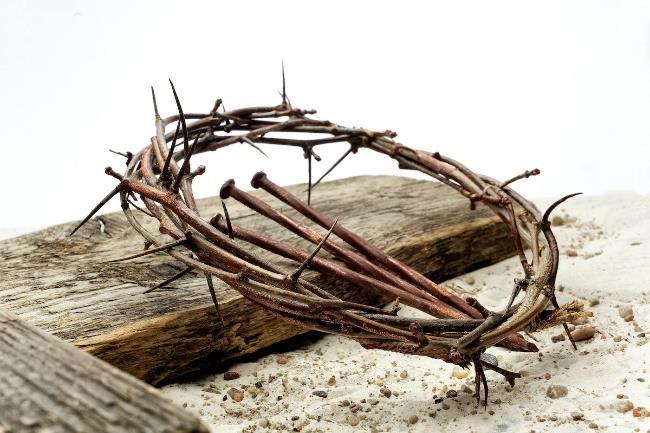
The cross was even more offensive to the Jews because of the Law of Moses. Deuteronomy 21:2223 says, “If a man has committed a sin worthy of death, and he is put to death, and you hang him on a tree, his body shall not remain overnight on the tree, but you shall surely bury him that day, so that you do not defile the land which the Lord your God is giving you as an inheritance; for he who is hanged is accursed of God.” Because of this passage, the Jews understood someone who was hung on a tree or
crucified to be abandoned by God. This is also the reason why the crucifixions were not allowed to take place in the city. The crucifixions would take place outside of the city walls because to be crucified was an abomination to the Jews as well.
Because the crucifixions took place outside the city walls, one would have to travel a distance from the Praetorium in the fortress of Antonia to the city walls. Normally, the person condemned to crucifixion would carry his cross, supposed by scholars to be the crossbeam, to the place of his death. However, Jesus was unable to do so, likely because of the flogging He had undertaken. Jesus is in an extremely weakened condition and the severity of the flogging He endured cannot be overemphasized. Because Jesus could not carry the cross from the city, the Romans called into service a man named Simon from Cyrene. The Romans had the power to press a person into service for a particular task. It seems that Simon had to be one of the nearest men, and therefore was pressed into service to carry the cross. It is interesting that Mark makes the side point that Simon was the father of Alexander and Rufus. This point suggests that Christians knew who Alexander and Rufus were. Perhaps Simon was already a follower of Christ, or became a follower of Christ because of what he saw that day. In any event, it seems clear that his sons certainly became followers of Jesus. Simon carries the cross to the place called Golgotha. In our language, the place was simply called the skull. This certainly gives a feel for the horrible place that Jesus was going for the people to know this place as simply the skull.
And they gave him to drink wine mingled with myrrh: but he received it not. And when they had crucified him, they parted his garments, casting lots upon them, what every man should take. And it was the third hour, and they crucified him. And the superscription of his accusation was written over, THE KING OF THE JEWS. And with him, they crucify two thieves; the one on his right hand, and the other on his left. And the Scripture was fulfilled, which saith, And he was numbered with the transgressors. And they that passed by railed on him, wagging their heads, and saying, Ah, thou that destroyest the temple, and buildest it in three days, Save thyself, and come down from the cross.--Likewise also the chief priests mocking said among themselves with the scribes, He saved others; himself he cannot save. Let Christ the King of Israel descend now from the cross, that we may see and believe. And they that were crucified with him reviled him.
Once they arrive at the skull, Jesus is offered wine mixed with myrrh. Wine mixed with myrrh was a first century drug to deaden the pain of driving the nails through the wrists and through the feet. Jesus refuses the wine mixed with myrrh. We assume the reason was that He was ready to experience the full pain and suffering of the crucifixion. No one can argue that He did not feel what was happening to Him, or that He was out of His mind on the cross because He had drunk wine mixed with myrrh. Jesus felt every ounce of the suffering and pain of the cross. Amazingly, none of the gospel writers record the details of the crucifixion. Everyone in the first century fully understood the horror of the crucifixion such
that these four words were enough: “then they crucified Him.” These four words sum up the humiliation of being stripped naked for crucifixion. These four words sum up the agony as the hands were placed on the crossbeam and driven into the wood by large iron nails. These four words describe Jesus being lifted up on that cross and being put into place, on public display outside the city walls, in the place of the skull. Casting lots for clothing
In verse 24, we read that the soldiers divided Jesus’ clothes and cast lots for them to decide what each would get. This was the accepted right of the executioner’s squad to claim the minor possessions of the victim. This event was also the fulfillment of a prophecy spoken 1000 years before. David said, “For dogs have surrounded Me; the assembly of the wicked has enclosed Me. They pierced My hands and My feet; I can count all My bones. They look and stare at Me. They divide My garments among them, and for My clothing they cast lots” (Psalm 22:16 -18).
Therefore, the scripture tells us that it was nine in the morning when Jesus was lifted up on the cross. The inscription of the charge above Jesus read, “Jesus of Nazareth, the king of the Jews.” The chief priests protested this inscription and demanded that it read “this man claimed to be king of the Jews.” However, Pilate would not change the inscription saying, “what I have written I have written.” Along with Jesus, we find that there were two other criminals crucified with Him. It is interesting to notice that the description given of these two criminals is also assigned to Barabbas in John 18:40. Recall that Barabbas was a revolutionary and an insurrectionist trying to overthrow the Roman power in Judea. It is possible that these two criminals also had the same charge against them and may have been accomplices with Barabbas. By being crucified with these men, the prophecy of Isaiah 53:12 was fulfilled which said the Messiah would be numbered with the outlaws and transgressors.
While hanging on the cross, those who passed by were shouting insults and blaspheming Jesus, shaking their heads at Him, calling for Jesus to save Himself by coming down from the cross. The One who claimed to be able to tear down the temple and raise it up in three days (though Jesus did not say this about the temple, but about Himself) could not save Himself, the crowds believed. Of course, the Jewish leaders, including the chief priests and the scribes, were mocking Jesus as well. As we read these words, we must see the mockery and sarcasm in what the people are saying. The scribes say, “He saved others; He cannot save Himself!” The Jewish leaders consider this a great mockery, for Jesus claimed to offer salvation to those who would come to Him. However, Jesus cannot save Himself from what they are doing to Him.
Further, Jesus is taunted that if He would simply come down from the cross, they would all believe. Jesus could have come down off that cross, but it would have been too late for these people, if He had done so. How much I read this passage and wish Jesus would have come down off that cross and shown them their error, as they would have had to beg for mercy. But Jesus remained on the cross because He had a purpose, which was and is to save the world from their sins. Even worse, those who were crucified with Jesus were also
taunting Jesus. One of the criminals said, “Aren’t you the Christ? Save yourself and us!” (Luke 23:39) What mocking and blaspheming the Son of God endured that day!
And when the sixth hour was come, there was darkness over the whole land until the ninth hour. And at the ninth hour Jesus cried with a loud voice, saying, Eloi, Eloi, lama sabachthani? which is, being interpreted, My God, my God, -- why hast thou forsaken me?
And some of them that stood by, when they heard it, said, Behold, he calleth Elijah. And one ran and filled a sponge full of vinegar, and put it on a reed, and gave him to drink, saying, Let alone; let us see whether Elijah will come to take him down. And Jesus cried with a loud voice, and gave up the ghost. And the veil of the temple was rent in twain from the top to the bottom. And when the centurion, which stood over against him, saw that he so cried out, and gave up the ghost, he said, Truly this man was the Son of God.There were also women looking on afar off: among whom was Mary Magdalene, and Mary the mother of James the less and of Joses, and Salome; (Who also, when he was in Galilee, followed him, and ministered unto him;) and many other women which came up with him unto Jerusalem.
In verse 33, we see that it was noon. There were at least three or four miracles that took place during the crucifixion and death of Jesus. Mark records two of these miracles, and we will spend our time considering only these two. The first miracle is the darkness coming over the land at noontime and lasting for three hours. While most versions say that this happened over the land, there is reason to believe that it happened over the earth. The Greek word ge can refer to earth or land. The word is used 189 times to refer to the world or the earth and is used 62 times to speak of land, ground, or country. However, it seems that when the word refers to land, the context is very obvious. For example, it is used in statements like “the land of Sodom and Gomorrah,” “the land of Zebulun,” “the land of Israel,” and so forth. However, when the word ge is alone, it is translated “earth.” Therefore, it is reasonable for us to understand that the darkness was over the whole earth. Tertullian says that it was a well-observed phenomenon, because he tells the heathen nations to look in their annals of history to see the record of this darkness. Of course, this is an amazing miracle that has been explained away by unbelievers through natural means. The most common explanation is that this was simply an eclipse. However, there is no eclipse that causes this much darkness. There is no eclipse that lasts for three hours. Further, it was the time of the Passover, when it was a full moon, meaning there could not be a solar eclipse. This darkness over the earth was a supernatural act of God. No other explanation can be given for it. What a powerful event that would surely have made people stop and take notice! Imagine what you would think if in a few moments instead of seeing light from twelve to three in the afternoon, it was totally dark. This is simply another proof that hanging on the cross is Jesus, the Son of God.
At three in the afternoon, after three hours of darkness have passed, Jesus now cries out with a loud voice, “My God, My God, why have You forsaken Me?” Now, we can make some fanciful statements that the reason for the darkness was that God had turned His back on Jesus, severing fellowship with the Son, and therefore cataclysmic events were taking place. But the scriptures never say these words? So if this is not the case, why does Jesus utter these words?
I believe Jesus is showing those watching Him that the things which are happening are the fulfillment of Old Testament prophecy. I believe this can be substantiated in two ways. First, Jesus said that the Father would never forsake Him. In speaking about His coming crucifixion, Jesus said, “When you lift up the Son of Man, then you will know that I am He, and that I do nothing of Myself; but as My Father taught Me, I speak these things. And He who sent Me is with Me. The Father has not left Me alone, for I always do those things that please Him” (John 8:28 -29). Later, Jesus made this point again to His disciples, saying, “Indeed the hour is coming, yes, has now come, that you will be scattered, each to his own, and will leave Me alone. And yet I am not alone, because the Father is with Me” (John 16:32). We must accept that Jesus said that the Father would not forsake Him, even though the disciples would. So either Jesus was wrong when He said these words, or Jesus was trying to do something else. As I said, I believe He was teaching. Saying the words “My God, My God, why have You forsaken Me” is the very first line of the 22nd Psalm. Memorizing the first few words of the passage was the way the Jews remembered and memorized the scriptures. By saying these words, Jesus is calling to the Jews’ minds this very psalm. What is the message of Psalm 22? David felt like he was forsaken by God, but came to realize that though events made it seem he was forsaken, God was right there all along (Psalm 22:24). Why was this important? This was important because of the scripture that Says, “cursed is anyone who hangs on a tree.” The Jews understood that since Jesus was hanging on a cross, God had abandoned Him. Jesus is teaching by fulfilling this prophetic psalm that He was not forsaken by God. In fact, Psalm 22 ends by saying that God has done this. This is the will of God. God has done this. But if we look more carefully, we will see that the word “this” is not in the original language, but is supplied by the translators for clarity. Therefore, this psalm literal ends, “he is done” or “it is done,” for it is just one Hebrew word. These are the very words that Jesus Himself utters from the cross, “It is finished” or “It is done.” Jesus quotes the first verse and the last verse of Psalm 22 to teach the people that this is the will of God and that, just as He said, He is not forsaken by the Father. In verse 35 we see more of the mockery that Jesus endured. In great sarcasm, some standing there announce that Jesus is calling for Elijah. “Let us see if Elijah comes to take Him down.” He could have called ten thousand angels to take Him down off that cross. Yet again, Jesus endures the mockery.
This leads to the second miracle that Mark records, which is the veil of the temple being split in two from top to bottom. Now, in our minds this is not miraculous. So what if a veil was torn in two. We know the spiritual implications because the writer of Hebrews tells us
that this was symbolic, signifying that all could now come into the presence of God to obtain mercy and grace (Hebrews 4:14 -16; Hebrews 9-10). It was symbolic of the end of the copies, as Jesus was passing through the holy place of heaven as a high priest making atonement for our sins with His blood. The act of the tearing of the veil has deep significance, showing the access to the blood of Jesus Christ we all can obtain. This event showed that the Old Testament had been fulfilled. But we also must see that this was a miraculous event. In our minds, when we read this passage, we think of a veil that is large enough to cover a standard doorway. I have always had this idea in my mind. But that would be a false idea. The veil that covered the doorway into the Holy of Holies was 60 feet high and had a thickness of one cubit. No person could tear this veil. It has been said that a herd of bulls could not have torn this veil; especially in the manner, it was torn. This veil could not have been torn by natural means because of its thickness. Try tearing any material that is about 18 inches thick. You will not get too far in your efforts. But even more so, note the direction the veil was torn. The veil was torn from top to bottom, not bottom to top. Man would tear a 60-foot veil from bottom to top. This was God’s tearing the veil from the top down to the bottom. Scholars say that at about three in the afternoon the priests would have been in the temple preparing for the evening sacrifice. Suddenly, the veil was torn from top to bottom, surely dropping the jaws of every priest, as they would have run out telling everyone what had just happened in the temple. When Jesus breathed His last, one of the Roman soldiers standing there, a centurion, saw the way Jesus died and confessed, “This man really was the Son of God!” With that, Jesus dies, an innocent man, in one of the most cruel and horrible deaths known to man. From the distance, many of the women who had been following Jesus saw the agonizing events of the death of the Son of God. Thus, the words of Isaiah 53:4-9 were fulfilled.
A. JESUS, A CURSE ON OUR BEHALF
As we conclude, let us consider the words of Paul in Galatians 3:10-14. For as many as are of the works of the law are under the curse: for it is written, Cursed is every one that continueth not in all things which are written in the book of the law to do them. But that no man is justified by the law in the sight of God, it is evident: for, The just shall live by faith. And the law is not of faith: but, The man that doeth them shall live in them. Christ hath redeemed us from the curse of the law, being made a curse for us: for it is written, Cursed is every one that hangeth on a tree: That the blessing of Abraham might come on the Gentiles through Jesus Christ; that we might receive the promise of the Spirit through faith.
Paul begins by trying to make us see that each of us is cursed. God made the pronouncement that everyone is cursed who does not continue doing everything written in the book of the law. God’s covenant was very simple: be like God and have eternal life; disobey and suffer eternal punishment and be cursed. No one, however, is justified by the law, because all have disobeyed the law. No one has continued doing everything that God has written. Therefore, you and I are cursed and we are all lost. But instead of leaving us in this condition, God made a plan before the creation of the world to send a Deliver who could take away our sins. We need to be purchased back to life, the concept behind the word “redeemed.” Christ came to purchase us from the curse that was against each
of us. How did He buy us back? Christ purchased us by becoming a curse on our behalf. He endured great suffering as if one cursed by God. But instead of being cursed by God, this was the purpose of God so that all people could have the blessings of God. We now can receive the blessing of Abraham in being a child of God. We can now receive the promise through faith in Jesus. The promise of true living, of deliverance, of salvation, of eternal life, of heaven, of forgiveness, and of hope are all realized and found through faith in Jesus. This conclusion is again drawn in Galatians 3:26, “For you are all sons of God through faith in Christ Jesus.” How do we become children of God? How can we be with Christ? The next verse says, “For as many of you as have been baptized into Christ have put on Christ” (Galatians 3:27). When we do that, then we are Christ’s. “And if we are Christ’s, then we are Abraham’s seed, heirs according to the promise” (Galatians 3:29).
Friends, the message is as simple and as plain as that. If you have not acknowledged your need for Jesus as your personal Savior and repented for and received forgiveness of your sins, then you are still living under the curse. Ultimately, God is your Creator, but you are not a child of God. If you have not repented, then sins remain upon you and you are defiled in God’s sight. You are separated from Him. You can be saved by receiving Jesus as your personal Savior and asking for the forgiveness of your sins. You can be a child of God, you can have the curse removed, and you can show that you trust in Jesus by being baptized. Jesus came into this world for you. Won’t you respond to Him now?


FOCUS SCRIPTURE: Isaiah 53
COURSE OBJECTIVES:
Believe: Jesus' coming was the plan for salvation
Feel: The depth of his love through his sacrifice on the cross Do: To testify, demonstrate, and walk in the love of Christ more readily
INTRODUCTION: Christ, after preaching his Father's message to the world for three and onehalf years, is illegally arrested, tried, and executed. God, however, resurrects him from the dead after he spends three full days in the tomb.
Though the work of providing a sinless sacrifice through which man can be reconciled to God was complete, Christ had a few more things to accomplish before his final farewell to his disciples. The Bible tells us that Jesus appeared nine times, in human form, to various sets of people before the birth of the New Testament church occurred on Pentecost. This timeline delineates each of these manifestations during this ministry period.
It is important for us to note the many appearances and subsequently understand the time in which they occurred. Often, we can read isolated stories about Jesus and misplace the timing of the events (i.e., before or after he was resurrected).
#1 - Mary MagdaleneMary Magdalene was a woman who had SEVEN demons cast from her early in Jesus' ministry (Mark 16:9, Luke 8:1-3).
1And it came to pass afterward, that he went throughout every city and village, preaching and shewing the glad tidings of the kingdom of God: and the twelve were with him, 2 And certain women, which had been healed of evil spirits and infirmities, Mary called Magdalene, out of whom went seven devils, 3And Joanna the wife of Chuza Herod's steward, and Susanna, and many others, which ministered unto him of their substance. (Luke 8:1-3)
She was one of the close circles of family and friends who followed his ministry until his life ended on the cross. Mary is the first human Jesus chose to reveal himself alive to early Sunday morning, after God brought him back from the dead the previous day (Mark 16:9 - 11, John 20:11 - 18).
11But Mary stood without at the sepulchre weeping: and as she wept, she stooped down, and looked into the sepulchre, 12And seeth two angels in white sitting, the one at the head, and the other at the feet, where the body of Jesus had lain. 13And they say unto her, Woman, why weepest thou? She saith unto
them, Because they have taken away my Lord, and I know not where they have laid him. 14And when she had thus said, she turned herself back, and saw Jesus standing, and knew not that it was Jesus. 15Jesus saith unto her, Woman, why weepest thou? whom seekest thou? She, supposing him to be the gardener, saith unto him, Sir, if thou have borne him hence, tell me where thou hast laid him, and I will take him away. 16Jesus saith unto her, Mary. She turned herself, and saith unto him, Rabboni; which is to say, Master. 17Jesus saith unto her, Touch me not; for I am not yet ascended to my Father: but go to my brethren, and say unto them, I ascend unto my Father, and your Father; and to my God, and your God. 18Mary Magdalene came and told the disciples that she had seen the Lord, and that he had spoken these things unto her. (John 20:11-18).
#2 - A surprise visit - Jesus on the road to Emmaus
Jesus miraculously appears to two men while they are walking to Emmaus (Luke 24:13-33), a small village that was roughly seven miles (11.2 kilometers) from Jerusalem. He chides them for not believing what the prophets foretold regarding the Messiah then explains to them all the Biblical verses that pertained to him.
The two men do not realize whom they are talking with until they all sit to eat. The moment 'their eyes were opened' and they realized it was Jesus they were talking with, he vanished from their sight!
13 And, behold, two of them went that same day to a village called Emmaus, which was from Jerusalem about threescore furlongs. 14And they talked together of all these things which had happened. 15And it came to pass, that, while they communed together and reasoned, Jesus himself drew near, and went with them. 16 But their eyes were holden that they should not know him. 17And he said unto them, What manner of communications are these that ye have one to another, as ye walk, and are sad? 18And the one of them, whose name was Cleopas, answering said unto him, Art thou only a stranger in Jerusalem, and hast not known the things which are come to pass there in these days? 19And he said unto them, What things? And they said unto him, Concerning Jesus of Nazareth, which was a prophet mighty in deed and word before God and all the people: 20And how the chief priests and our rulers
delivered him to be condemned to death, and have crucified him. 21But we trusted that it had been he which should have redeemed Israel: and beside all this, to day is the third day since these things were done. 22Yea, and certain women also of our company made us astonished, which were early at the sepulchre; 23And when they found not his body, they came, saying, that they had also seen a vision of angels, which said that he was alive. 24And certain of them which were with us went to the sepulchre, and found it even so as the women had said: but him they saw not. 25Then he said unto them, O fools, and slow of heart to believe all that the prophets have
spoken: 26 Ought not Christ to have suffered these things, and to enter into his glory?
27 And beginning at Moses and all the prophets, he expounded unto them in all the scriptures the things concerning himself. 28 And they drew nigh unto the village, whither they went: and he made as though he would have gone further. 29 But they constrained him, saying, Abide with us: for it is toward evening, and the day is far spent. And he went in to tarry with them. 30 And it came to pass, as he sat at meat with them, he took bread, and blessed it, and brake, and gave to them. 31 And their eyes were opened, and they knew him; and he vanished out of their sight. 32 And they said one to another, Did not our heart burn within us, while he talked with us by the way, and while he opened to us the scriptures? 33 And they rose up the same hour, and returned to Jerusalem, and found the eleven gathered together, and them that were with them (Luke 24:13-33)
This is the first time Jesus shows himself alive to those who participated in his last Passover meal. His miraculous manifestation occurs while the disciples are behind closed doors in fear of the Jews. For reasons unknown, the disciple named Thomas was not with the group at this time (see John 20:19).
After Christ leaves, the disciples tell Thomas that the Lord appeared to them. Thomas doubts (which is where the phrase 'doubting Thomas' came from) their words and states "Unless I see the nail marks in His hands, and put my finger into the nail marks, and put my hand into His side, I will not believe at all" (John 20:25).
19 Then the same day at evening, being the first day of the week, when the doors were shut where the disciples were assembled for fear of the Jews, came Jesus and stood in the midst, and saith unto them, Peace be unto you. 20 And when he had so said, he shewed unto them his hands and his side. Then were the disciples glad, when they saw the Lord. 21 Then said Jesus to them again, Peace be unto you: as my Father hath sent me, even so send I you. 22 And when he had said this, he breathed on them, and saith unto them, Receive ye the Holy Ghost: 23 Whose soever sins ye remit, they are remitted unto them; and whose soever sins ye retain, they are retained. 24 But Thomas, one of the twelve, called Didymus, was not with them when Jesus came. (John 20:19-24)
Jesus miraculously manifests himself again to his disciples, but this time Thomas is present (John 20:26-29). Although this constitutes the Lord's fourth time, he has shown himself to humans to prove he has risen from the dead, this is the first time all those (except Judas) who ate Passover with him see him as a group. The Lord allows Thomas to observe the wounds he received in order to strengthen his faith.
26 And after eight days again his disciples were within, and Thomas with them: then came Jesus, the doors being shut, and stood in the midst, and said, Peace be unto you. 27 Then saith he to Thomas, Reach hither thy finger, and behold my hands; and reach hither thy hand, and thrust it into my side: and be not faithless, but believing. 28 And Thomas answered and said unto him, My Lord and my God. 29 Jesus saith unto him, Thomas, because thou hast seen me, thou hast believed: blessed are they that have not seen, and yet have believed. (John 20:26-29)
The apostle Paul is the only New Testament writer that mentions Jesus appeared to over five hundred brethren at one time after his resurrection (1Corinthians 15:6). He does not specify an exact date when this event occurred.
3 For I delivered unto you first of all that which I also received, how that Christ died for our sins according to the scriptures; 4 And that he was buried, and that he rose again the third day according to the scriptures: 5 And that he was seen of Cephas, then of the twelve: 6 After that, he was seen of above five hundred brethren at once; of whom the greater part remain unto this present, but some are fallen asleep. (I Corinthians 15:3-6)
After partaking of his last Passover, Jesus told his eleven disciples (Judas was betraying him at the time) as they walked toward the Garden of Gethsemane, "But after I have been raised, I will go before you into Galilee" (Matthew 26:32, see also Mark 14:28). The Bible records this meeting did occur (Matthew 28:16 - 17).
16Then the eleven disciples went away into Galilee, into a mountain where Jesus had appointed them. 17And when they saw him, they worshipped him: but some doubted. 18And Jesus came and spake unto them, saying, All power is given unto me in heaven and in earth. 19Go ye therefore, and teach all nations, baptizing them in the name of the Father, and of the Son, and of the Holy Ghost: 20Teaching them to observe all things whatsoever I have commanded you: and, lo, I am with you always, even unto the end of the world. Amen. (Matthew 28:16-20)
Jesus shows himself to seven of his disciples while they are fishing on Lake Galilee (John 21:1-24). Those who saw him were Peter, John, James, Thomas, Nathanael, and two other unnamed disciples (likely Andrew and Philip, who lived in the general area).
During this appearance, Peter miraculously catches 153 fish in his net, then has Jesus ask him three times if he loves him. Peter then learns he will die a martyrs' death. Christ also
alludes that John will remain alive long enough to write about the end of the age and his Second Coming.
After these things Jesus shewed himself again to the disciples at the sea of Tiberias; and on this wise shewed he himself. 2There were together Simon Peter, and Thomas called Didymus, and Nathanael of Cana in Galilee, and the sons of Zebedee, and two other of his disciples. 3Simon Peter saith unto them, I go a fishing. They say unto him, We also go with thee. They went forth, and entered into a ship immediately; and that night they caught nothing. 4But when the morning was now come, Jesus stood on the shore: but the disciples knew not that it was Jesus. 5Then Jesus saith unto them, Children, have ye any meat? They answered him, No. 6And he said unto them, Cast the net on the right side of the ship, and ye shall find. They cast therefore, and now they were not able to draw it for the multitude of fishes. 7Therefore that disciple whom Jesus loved saith unto Peter, It is the Lord. Now when Simon Peter heard that it was the Lord, he girt his fisher's coat unto him, (for he was naked,) and did cast himself into the sea. (John 21:1-7)
#8 - Special appearance to James
Jesus made a special appearance to James, his physical half-brother (Matthew 13:55, Mark 6:3, Galatians 1:19). This manifestation, according to Paul, took place between Christ's appearance before 500+ people and a time he appeared to all the apostles (1Corinthians 15:5 - 7). It is unclear whether Paul is referencing Christ's first meeting in Galilee or his last manifestation when he ascended into heaven.
6After that, he was seen of above five hundred brethren at once; of whom the greater part remain unto this present, but some are fallen asleep. 7After that, he was seen of James; then of all the apostles. (1 Corinthians 15: 6-7)
#9 - Commission and ascension
Jesus meets with the disciples on the Mount of Olives (Acts 1). Just before his ascension into heaven, He gives them what is referred to as the Great Commission. He also tells them to wait ten more days in the city of Jerusalem so that they may receive the power of the Holy Spirit. (Matthew 28:18 - 20, Mark 16:15 - 18, Acts 1:4 - 5).
The disciples ask Jesus if he will NOW restore the kingdom to Israel. He states that it is not for them to know when this will occur and reminds them of the POWER they will soon receive from God. He then blesses the disciples and begins to rise above the mount as he ascends to heaven.
Two angels in white appear as the disciples gaze at the Lord lifting above the clouds. The angels tell them that Jesus will come back to the earth in the same way they saw him leave (Mark 16:19 - 20, Luke 24:50 - 53, Acts 1:6 - 11).
6 When they therefore were come together, they asked of him, saying, Lord, wilt thou at this time restore again the kingdom to Israel? 7 And he said unto them, It is not for you to know the times or the seasons, which the Father hath put in his own power. 8 But ye shall receive power, after that the Holy Ghost is come upon you: and ye shall be witnesses unto me both in Jerusalem, and in all Judaea, and in Samaria, and unto the uttermost part of the earth. 9 And when he had spoken these things, while they beheld, he was taken up; and a cloud received him out of their sight. 10 And while they looked stedfastly toward heaven as he went up, behold, two men stood by them in white apparel; 11 Which also said, Ye men of Galilee, why stand ye gazing up into heaven? this same Jesus, which is taken up from you into heaven, shall so come in like manner as ye have seen him go into heaven.
The disciples wait ten days in Jerusalem, as instructed by Christ, for the promise of God's spirit. Finally, on the day of Pentecost, the birth of the New Testament church occurs when God gives his spirit to more than 3,120 people (Acts 2)! Jesus' ministry after his resurrection sets the groundwork for the perfect beginning of the Christian church!
The promise of the Holy Spirit, our comforter, teacher, and guide was manifested as Christ declared. That same power through the Holy Spirit is available to every believer today!

